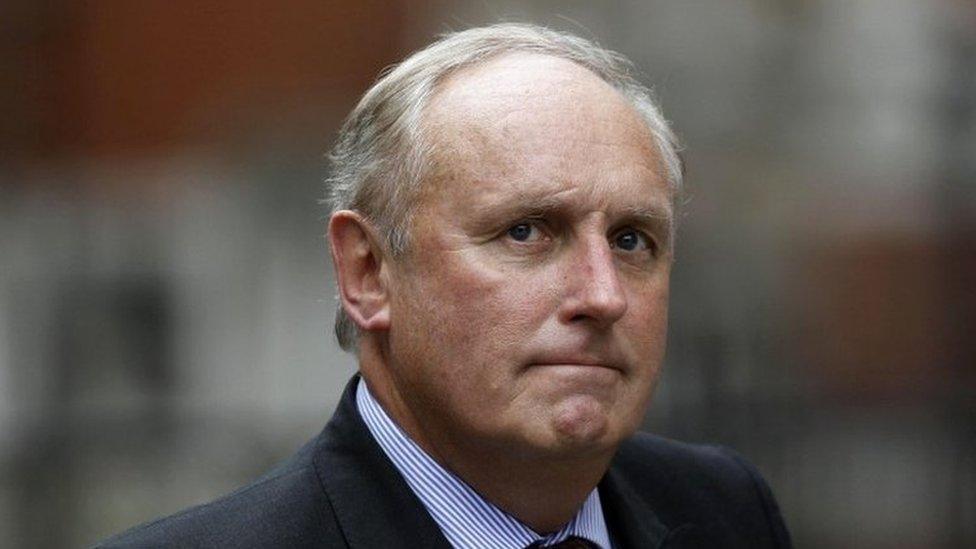Paul Dacre and Ofcom: What's going on?
- Published

Paul Dacre was Daily Mail editor for 26 years
Trying to bring useful allies into the tent does not always work out as planned, as Boris Johnson has discovered with the spectacular unravelling of his political friendship with Dominic Cummings.
And while all eyes at Westminster were on Mr Cummings' evidence to MPs this week, another plan thought to have been hatched in Number 10 was not going according to the script.
The former Daily Mail editor Paul Dacre has, for some months, been seen as Downing Street's favoured candidate to be the next head of Ofcom, the independent broadcast and telecoms regulator.
This is a hugely important, national role. Ofcom has wide-ranging powers over television, radio, telecoms and postal services, dealing with licensing, complaints and much else besides.
Mr Dacre is a Fleet Street legend - revered by some, reviled by others - so the suggestion that Number 10 wanted to put him in charge of Ofcom sharply divided opinion.
He duly applied for the job, along with several others (I'm told the government did not use headhunters, as it sometimes does for major appointments).
'Unappointable'
The candidates were interviewed by an independent panel, which can raise red flags if it has concerns about any of the contenders, but it is the government that makes the final decision.
Former rail regulator Sir Tom Winsor, Conservative former culture minister Lord Vaizey and Maggie Carver, Ofcom's deputy chair, are also reported to be in the running.
Fast forward to the beginning of this week, just before Mr Cummings began his bombing raid across SW1, when whispers reached my ears that for those who wanted to see Mr Dacre in the Ofcom job, there was a problem.
The interview panel had concluded that he was "unappointable" for the role. I'm told there were concerns about his style and appropriateness for the job.
Mr Dacre is thought to be the prime minister's favoured candidate, but the interviews are understood to have been choppy.
So, according to the sources I spoke to, the government faced a tricky decision.
'Widen the pool'
It could either push on with Mr Dacre, see him into the job, but admit that the interview panel had doubts, as it would have been obliged to do - or call a halt to the process, regroup and re-run the whole thing.
It's very important to say that, at the start of this week, not a soul associated with the process wanted to make a comment on it. There was no official confirmation of the panel's verdict on any of the candidates.
And there was no official comment, even 72 hours ago, about where the process had got to.
But it felt clear that, somehow, it was all coming to a head.
A couple of Thursday's newspapers reported that the whole selection process is to be run again - and this time headhunters may be involved, as the government wants to "widen the pool" of candidates.
Thursday was also, perhaps not coincidentally, the day that whoever had made the final cut was due to be put through their paces by the Commons culture committee, according to two different sources, although this was never officially confirmed.
'Digital monster'
Press reports suggested that the big tech companies had been involved, external in trying to stop Mr Dacre taking the job on.
The former editor, who remains editor-in-chief of the Mail's parent company DMG Media, is well known for his swipes at the BBC, external.
But he has also argued in the past that the big online platforms, external should be regulated like rest of the media, warning they are "arrogantly unaccountable", and talking of a "digital monster".
A spokesperson for the Department for Culture, Media and Sport told me: "In accordance with the governance code of public appointments, ministers have taken the decision to re-run the competition for the Ofcom chair."
Mr Dacre declined to comment, and it's not yet clear if he is still interested in the job.
It's also not clear when Ofcom will have a permanent chair.
One thing is clear at the end of a very torrid week round here: that when even the PM tries to bring controversial potential allies on board there is no such thing as a guarantee of a happy ending.
